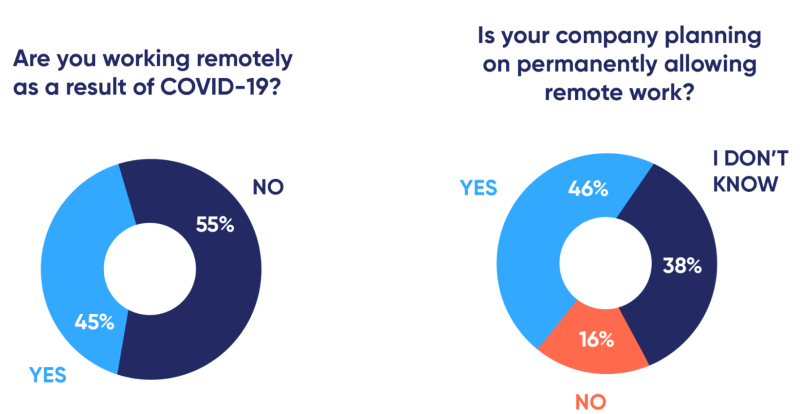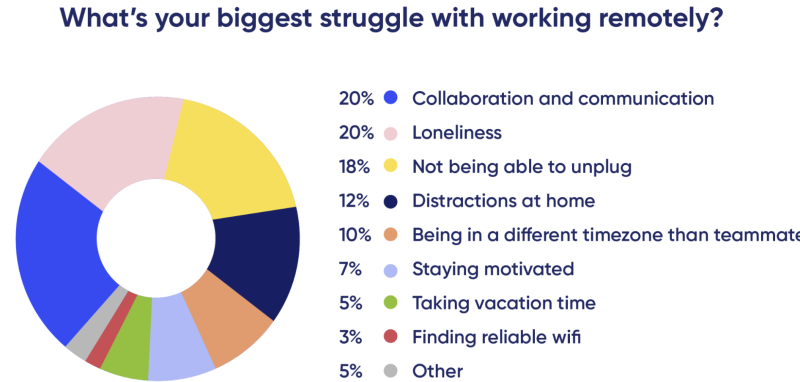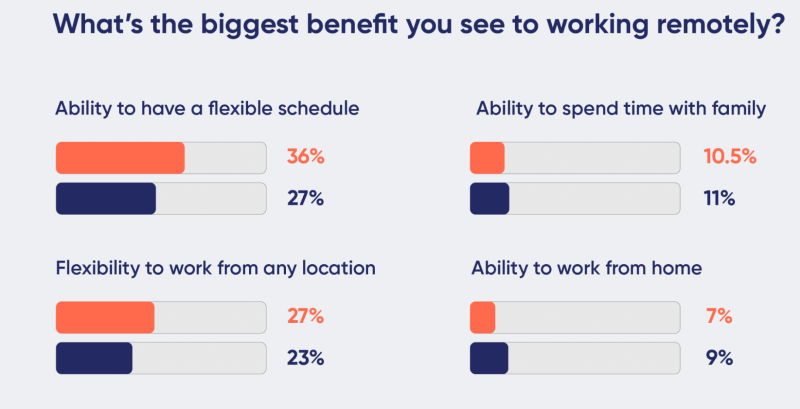

Working from home has gone from a dream to a reality for many people in the wake of the COVID-19 pandemic. The challenges of working from home have also presented themselves.
The way we work has changed forever, and it seems like there’s no going back.
We all love doing Zoom meetings in our pajama pants and hanging out with our pets all day. That’s a given. But remote work also has its drawbacks.
Let’s take a look at 12 specific challenges of working from home and how to overcome them. We’ve included actionable work-from-home tips and solutions to help you while working remotely.
The necessity of working from home in 2020 and 2021
The trend of remote work was already growing before 2020. But when the COVID-19 pandemic hit, it skyrocketed.
In 2021, the pandemic continues to affect the way we work. Forty-five percent of remote workers report that they are working from home because of the outbreak. While 46% say their organizations plan on making remote work permanent.

In spite of many people now finding themselves forced to work from home, it seems the majority are happy with the change and would like it to continue.
In fact, 97% of the remote workforce would like to continue working remotely at least some of the time for the rest of their careers. It seems that the benefits of remote work outweigh the drawbacks for employees.

There are drawbacks, though, and you and your team are bound to face them at some point.
Read on to discover how to identify and overcome the most common challenges of working from home.
Why is it essential to identify the challenges of remote work?
More people working remotely brings a new set of challenges that can negatively impact productivity if not addressed.
Employees have had to adapt to new ways of working. According to Buffer’s 2021 State of Remote Work report:
- 41% of new remote workers say the biggest change is how they collaborate and communicate with their colleagues.
- 22% say the biggest change is their location.
- 20% said their work hours are what has changed the most.

These changes present new problems for both leaders and their teams. It’s important to identify them to prevent or mitigate potential problems.
Identifying the challenges of working from home helps you develop strategies to keep yourself and your remote team resilient, motivated, and productive.
12 challenges of working from home and how to overcome them
The image below shows the main challenges remote workers face. As a leader or member of a remote team, you’ve probably come across a few of them already:

Let’s take a closer look at each of these challenges — plus a few others we feel are worth addressing — and some possible solutions to each of them.
1. Collaboration and communication
Communication between humans is already hard enough face-to-face, but it’s much harder when working from home.
People normally rely on nonverbal communication. This is why communicating effectively is one of the most common challenges you will face when working from home.
How to overcome this challenge:
Use the best communication technology available to facilitate communication with your team. Zoom, Slack, and Microsoft Teams are all great examples.
If you’re a team leader, organize regular meetings to make sure everyone is on the same page. Consider having an open-door policy so your team can approach you to ask questions related to their work or role.
Freelancers and entrepreneurs should also maintain frequent contact with clients and vendors to make sure expectations are aligned, and everything runs smoothly.
2. Loneliness
A lack of social interaction causes all of us to feel more isolated and lonely — especially those working from home.
Loneliness is bad for your mental and physical well-being and can affect your performance.
How to overcome this challenge:
Leaders should ensure that remote workers have the tools they need to navigate the challenges of loneliness.
If you’re working from home, try to plan social activities outside work that give you the social interaction you need. Do this of course while respecting the COVID-19 safety measures in your local area.
Organize regular video calls with friends and family, or try working in a coworking space or library.
3. Not being able to unplug
Working and living in one space can blur the lines between your work and personal life.
This can make it difficult to relax and switch off once the day is over, and maintaining a healthy work-life balance becomes a challenge.
How to overcome this challenge:
Create a dedicated office space in your home. Better yet, if you’re able, go work somewhere else, such as a coffee shop. This can help you create boundaries between your work and private life.
4. Distractions at home
Even the most disciplined and organized remote team members get distracted at home.
A pile of dirty dishes or a dusty bookshelf might start calling your name. Then, a 20-minute break turns into two hours. Those who live with family or roommates also face regular, concentration-busting interruptions.
How to overcome this challenge:
Try to find a quiet space in your home for working and remove all distractions. If possible, close the door and ask your co-inhabitants not to interrupt you, except in case of emergency.
5. Being in a different time zone than teammates
An increasing number of companies are working across multiple time zones. This can make coordinating with intercontinental colleagues a challenge.
How to overcome this challenge:
Leverage project manager, instant messaging, and file-sharing services to collaborate with international teams.
Leaders should encourage teammates to set regular working hours and communicate them to the rest of the team.
6. Motivation
It’s easy to lose motivation when working from home, whether you’re a remote employee or self-employed.
The lack of external inputs and interaction with coworkers can make you lose sight of your long-term career goals. Ultimately, losing motivation.
Then add the stress of the COVID-19 pandemic, and it’s no surprise that remote teams are losing motivation.
How to overcome this challenge:
Write down your long-term goals. Include goals that relate to your career, finances, and personal aspirations. Revisit them regularly to keep them fresh in your mind. Consider posting them on the wall in your workspace.
Make sure your boss is aware of your career goals so they can keep you accountable. Attending industry events and conferences can also be a great motivational boost.
7. Taking vacation time
Taking vacations is essential for your physical and mental well-being. Vacation can actually increase your productivity, mental ability, and efficiency. Unfortunately, many people forget to take breaks when working from home.
How to overcome this challenge:
If you’re a leader, prioritize organizing your team’s vacations to make sure they take enough breaks and are well-rested.
8. Finding reliable wifi
A poor internet connection or out-of-date technology can cause frustration for everyone.
How to overcome this challenge:
As a leader, make sure your remote team members have everything they need to connect from home. Make sure this includes access to the latest versions of the apps and software you use.
You might even want to consider reimbursing internet costs so your team can invest in the fastest connection available.
As a remote worker, it can help to have your personal devices as a backup for your work computer in case it stops working.
Also, identify places with a good WiFi connection near your home that you can go to in case of emergency.
9. Bad habits
If you’ve lost your regular routine as a result of working from home, chances are you may have fallen into some unhealthy habits.
Perhaps you graze the contents of your fridge all day, eat your meals at random hours, or forget to exercise.
How to overcome this challenge:
Set reminders on your phone to get up and move around, take a walk around the block, or a short stretching or breathing break.
Make sure your body is nourished by incorporating lots of fresh vegetables and fruit into your diet.
Set aside 20-30 minutes per day for gentle exercise such as yoga, walking, or working out.
10. Time management
For many remote workers, managing your own schedule sounds like a dream, but it’s actually a major challenge of working from home.
While your working hours may be a little more flexible, you need to have the discipline to manage your time correctly. Without discipline, you run the risk of procrastinating or taking too many naps.
How to overcome this challenge:
Our brains and bodies work best with routine, so decide on the business hours that work for you and stick to them.
You may find it suits you to stick to conventional working hours, or prefer to plan your life to spend more time with your family.
11. The “Pajama Mindset”
While it’s tempting to roll out of bed, down your morning joe, and sit straight down at your desk to work, it’s not advisable.
Apart from the obvious hygiene issues, the clothes you wear affect your mindset.
When you’re dressed to impress, you feel and behave differently. Also, others perceive you differently.
How to overcome this challenge:
The way you dress may have changed since before the pandemic, but there’s still no excuse to be a slouch at work.
Invest in some smart but comfortable work-from-home clothes that will help you get in the right frame of mind for remote working.
12. Neglecting your network
Networking is an essential way for employees and entrepreneurs to stay connected, relevant, and up-to-date with their industries.
You’re more likely to find your next opportunity through your personal network. As a remote worker, however, it can be easy to lose touch.
How to overcome this challenge:
Attend industry events online to stay involved in your professional community. Also, don’t underestimate the power of social media for finding and maintaining professional relationships.
10 tools to overcome the challenges of working remotely
The many apps and software solutions available to remote workers help address the challenges of working from home.
Here are 10 of our favorites.
Tools to minimize distractions
1: Noise-cancelling headphones to block out unwanted noise.
2: Insulation to soundproof your doors and windows.
Project management tools
3: monday.com is a platform that lets you keep all your work in one place, including tasks, files, instant chats, and goals.
4: Trello is a project management tool that helps remote team members collaborate on projects and tasks.
Team communication and collaboration tools
5: Slack is an instant messaging tool that facilitates communication between remote employees.
Video conferencing tools
6: Zoom is a video conferencing app that allows you to organize meetings of up to 40 minutes with their free version. It allows instant chats, screen sharing, and file sharing.
7: GoToMeeting is a slightly more advanced tool that emphasizes security and is designed for businesses.
Accounting and invoicing tools
8: QuickBooks for bookkeeping.
9: Freshbooks for invoicing.
Time management tools
10: Toggl for time tracking and productivity reporting.
The pros of working from home
Of course, there are plenty of benefits to working from home. The image below shows some of the biggest benefits remote workers perceive.

The greatest benefits of working from home are similar for everyone. Whether you’re a veteran remote worker or have started working remotely since the pandemic.
The newer remote workers see not having to commute as the biggest advantage (28%) of working from home. While pre-pandemic remote workers see their flexible schedule (36%) as the most important benefit.
Other pros of working from home include:
- Being able to work from anywhere
- Spending more time with family
- Increased productivity
- Greater work-life balance
- Less stress
- Improved mental and physical health
- Reduced carbon footprint
Embracing remote work for the long-term
Remote work — and its challenges and benefits — are here to stay.
Team leaders, remote employees, freelancers, and entrepreneurs should follow the tips in this article to keep up motivation and productivity and reduce the risk of burnout.









You must be logged in to post a comment Login